- Home
- Michael P. Spradlin
Prisoner of War
Prisoner of War Read online
This book is lovingly dedicated to all the men and women of the Allied forces who endured their imprisonment in a Japanese POW camp with courage and honor. The free world owes each one of you a debt it can never repay.
The history of free men is never really written by chance, but by choice: their choice!
—Dwight D. Eisenhower
Title Page
Dedication
Map
Epigraph
Prologue
Part One: Invasion
Chapter One: Discovered
Chapter Two: Besieged
Chapter Three: Holding Out
Chapter Four: Chaos
Chapter Five: Surrender
Part Two: The Death March
Chapter Six: Arrival
Chapter Seven: The March
Chapter Eight: Descent
Part Three: Captivity
Chapter Nine: Prisoners
Chapter Ten: Reunited
Chapter Eleven: Living
Chapter Twelve: New Friends
Chapter Thirteen: Healing
Chapter Fourteen: Cruelty
Chapter Fifteen: Dealing
Chapter Sixteen: Rescue
Chapter Seventeen: Near Miss
Chapter Eighteen: Awakening
Chapter Nineteen: Delusion
Chapter Twenty: Charity
Part Four: Recovery
Chapter Twenty-One: Hopeless
Chapter Twenty-Two: Endless
Part Five: Liberation
Chapter Twenty-Three: At Sea
Chapter Twenty-Four: Sinking
Chapter Twenty-Five: Recaptured
Chapter Twenty-Six: The Beginning
Chapter Twenty-Seven: Release
Epilogue
Afterword
Sources
Acknowledgments
About the Author
Preview
Also by Michael P. Spradlin
Copyright
When my mom died, my home became a war zone. And my father was the enemy. Surly and resentful, he took out his anger on me. It’s ironic that to escape one war, I ran away and found another. But it wasn’t a war I chose. It was chosen for me.
She died when I was seven, and I spent every day of the next eight years of my life terrified of my father. That isn’t how it’s supposed to be. A kid shouldn’t be afraid of a parent. I might have been young, but even then I knew that much. I don’t know why he blamed me for my mother’s death, but he did. She died in a car accident. I was at school. If I’d been in the backseat distracting her—begging her to stop for an ice-cream cone the way I always did—maybe I’d understand why my pa was angry. My grandpa tried to convince me that it wasn’t my fault. That my dad was just so heartbroken he needed to blame someone for his loss. Pa chose me.
Six months after she died, when the shock finally wore off, things got really bad. My father always had a temper. But after the accident, Pa was angry all the time. I couldn’t do anything right. I’d clean up the supper table, and if I made too much noise putting the dishes in the sink, I’d get a backhanded slap across the cheek.
“Stop making so much dang noise!” he’d shout.
If I missed a speck of dirt sweeping the kitchen, he’d go berserk and chase me around the house with a wooden spoon.
“What are you, blind? Can’t even sweep a floor! You’re good for nothin’! Nothin’!”
We lived on a farm, and I had to do most of the chores. Milk the cows, feed the hogs and chickens before school, and in the spring, I’d even have to plow and plant. He worked me pretty hard. But I didn’t mind the work. I actually liked farming. I loved the feel of the soil in my hands. The crunch of the late fall frost under my feet as I walked from the house to the barn. And doing all those chores gave me a few moments every day when I didn’t have to be afraid. Hogs and chickens never yell at you.
Our farm was a beautiful spot—eighty acres on a rolling hillside outside of Duluth. My mother had loved it. I remember her working in her garden and feeding the animals in the morning. She would sing while she did it. She was barely over five feet tall, but farm life had made her strong. Somehow Pa stayed in line when she was alive. She made him happy. I could never quite figure out how she did it. But when she died, a piece of him did, too.
Nothing I did ever pleased him. And when he started drinking, things got even worse. He’d go into town after I got home from school. I’d be doing my homework after finishing my chores, and when he came home he’d always find something to pick at me about.
He started with the belt when I was nine. That was the worst.
It’s a horrible thing to live your life in fear. My grandpa would try to get him to leave me alone. But Grandpa was my mother’s father, a small, quiet man who’d lived on the farm since before I was born. He’d emigrated from Norway, and what English he spoke came out with a thick accent. Pa would just belittle him.
“What’d you say, old man? Get the marbles outta your mouth,” he’d grouse.
I don’t know why Grandpa didn’t leave. But I guess, like me, he had no place else to go. Maybe he stayed for me. To give whatever comfort he could. Or because this was where his daughter had lived. Whenever Grandpa said anything about the way Pa was treating me, my father would come down extra hard on me. “Blast it, Henry! I swear, I might as well go find me a four-year-old girl to come and do your chores for you. Maybe then they’d get done right.”
“Yes, Pa. Sorry,” I’d mutter. And try to make myself scarce.
No matter what I did, it was never enough. When I was ten I quit going to school. I was tired of explaining the black eyes and the welts on my cheeks. Mrs. King, my fourth-grade teacher, would quiz me about my bruises and cuts.
“Henry, what happened?” she would ask.
I’d always make something up, worried that if I said anything, it would just get worse. Mrs. King was persistent.
“Henry, are you sure you’re all right?” She was a nice lady. Her face was round and her eyes sparkled with kindness. She had curly black hair and wore glasses. In some ways she reminded me of my mother. I hated lying to her, but by then I was so scared of Pa that I couldn’t say anything except, “Yes, ma’am, just an accident. My grandpa says I’m just at that clumsy age. And last week one of the roosters took after me and pecked my face good. I don’t like that old rooster.”
It hadn’t always been like this. When my mother was alive, Pa was different. He would still get angry and surly, but she had a way of calming everyone she met. She would smile and look at you—really look at you—and it just made everything seem fine. I had a picture of her in my room. After she died, I found that when I wasn’t in the room staring at her picture, it was getting harder and harder to remember her face. There was so much turmoil in the house it was like she stood at the far end of some long hallway of my memory. And every day her presence faded from what had once been a happy home.
“Your mother was too soft on you,” Pa would yell when he was in one of his tempers. “She turned you into a weakling.” I tried as hard as I could not to act afraid and I never cried in front of him, no matter what he did. No matter how scared I was.
I used to pray that he would come home drunk and pass out so he would leave me alone. When I turned fourteen that was usually what happened. Grandpa and I had to work like demons to keep the farm running. And while all this was happening, I was growing. Farm work was making me strong. When I was fifteen, I was six feet, three inches tall. Almost as big as my dad.
Most people would say, “You’re strong now, Henry. Stand up to him. You don’t have to take it anymore.” Most people would be wrong. I might have been nearly as big and strong as he was, but I didn’t have anywhere near his anger or fury in my heart.
If I’d done that, I knew I’d be letting my mother down. I’d be more like him than her.
Getting away from him was my only chance. If I didn’t, nothing would ever change. He would continue hating me, and I would never stop being afraid. Right after my fifteenth birthday, the answer came to me. I would run away and join the Marines.
It turned out to be remarkably easy. First I told my grandpa what I was going to do. I needed his help. Without it, I’d be stuck under Pa’s thumb forever.
“No, Henry, no,” he pleaded.
“Grandpa, I’m sorry. But I can’t stay here anymore. And I can’t get away unless you help me.”
Finally he agreed. The next day, while Pa was off doing who knows what, we drove into Duluth. There was a United States Marine Corps recruiting station right on Main Street. Grandpa parked the truck, and we made our way into the office.
A tall man in a green uniform sat behind a desk. His face was all sharp angles, and his hair was trimmed in a crew cut. His uniform didn’t have a piece of lint or anything out of place on it. There were three stripes on his sleeve.
“Help you?” he asked.
“Yes, sir,” I said. “I’m here to enlist.”
“First, it’s not sir, it’s Sergeant. And second, how old are you?”
Grandpa stood next to me clutching his felt hat in both hands. I knew he was nervous. I hoped he wouldn’t give it away.
“I’m eighteen, si—Sergeant. Born October 11, 1923.”
“You got a birth certificate? Something proves that?”
“No, Sergeant. I don’t. I checked at the courthouse and I guess my ma and pa never got around to filing one.”
“I need proof of your age,” he said.
“Well, I heard if you had a relative who could confirm your age, you could join up. My grandpa is here. He can vouch for me.”
The sergeant looked at me, his eyes narrowing. Then he shifted his gaze to Grandpa. He studied him, and I could see Gramps starting to wilt. I had to get this over with quick.
“Grandpa, can you tell the sergeant? My birthday is October 11, 1923. Isn’t that right?”
“Yah,” he said, nodding. “Yah.” Whenever Grandpa got nervous or stressed his Norwegian accent got thicker.
“He doesn’t speak a whole lot of English,” I said.
“Is that right?” the sergeant said. His face was a mask of stone. I could not tell what he was thinking. He turned his gaze from Grandpa back to me. I could see Grandpa relax from the corner of my eye.
“What’s your name, boy?” he asked.
“Henry Forrest.”
“Why do you want to join the Marines?”
“Well … Sergeant, I always heard the Marines was the finest fighting force there is. And that’s what I want to be. I want to be one of the finest.”
I could tell I’d struck a nerve with the sergeant. The corners of his lips lifted up in a smile, just for the briefest of moments.
“You know it ain’t going to be easy,” he said.
“Yes, Sergeant, I know. But I’ve wanted to be a Marine since I was a kid.”
He wasn’t quite convinced.
“Where are your parents?”
“My ma died when I was seven. My pa ran off a couple years ago. Grandpa raised me mostly.”
The sergeant steepled his fingers and stared at me. I was afraid it wasn’t going to work. If it didn’t I’d try the Army or the Navy.
He sat up straight and opened a desk drawer.
“You need to fill out some forms,” he said. He slid a few pages across his desk and handed me a pen. I filled them out as fast as I could and signed my name, pushing them back to him.
“Congratulations. You’re on your way to being a Marine. And you’re in luck. There’s a train tomorrow leaving for Parris Island. That’s where you’ll do your basic training.” He pulled out another small booklet and filled it out, then tore out a strip of paper. “This is your ticket,” he said, handing it to me. “Don’t miss the train.”
I didn’t miss the train. But after all that came next, I would come to wish I had.
I stood firmly at attention. The only sound in the office was the whirring of the ceiling fan. All it succeeded in doing was pushing the hot and humid air around the room. Colonel William Forsythe sat at his desk, the top of which was empty except for a single file. I’d known it was my personnel file even if I hadn’t seen my photograph clipped to it. Why else would I be here, a lowly private ordered to report to the colonel’s office?
The old man was dressed in the usual khaki uniform. His tie was neatly knotted and lay straight on his shirt, and I wondered how he could stand it in this weather. There were never any sweat stains under the old man’s arms or around his collar. I had no idea how he did it. I could feel perspiration on my neck, flooding down my back. I imagined my shirt was drenched.
“Did you think we wouldn’t find out?” the colonel asked.
“I don’t understand, sir,” I barked in reply.
The colonel leaned back in his chair and stared at me. His face was tanned and lined from the sun. His crew cut showed snow-white hair all around his skull. He took a deep breath and puffed out his cheeks, letting the air out slowly.
“It’s over, boy,” the colonel said. “You’re underage. I don’t know how you got into the Marines, but I know how you are going to get out. You’ll return to the barracks to pack up your gear. You know, before I joined the Corps, I was in the cavalry.” He droned on, but Henry wasn’t paying attention. Something about how “things were different then, and the military didn’t tolerate the kind of shenanigans Henry was trying to pull.”
The colonel leaned back in his chair and put his feet up on his desk. He was wearing leather riding boots. They were shined to a high gloss and reached all the way to his knees. Colonel Forsythe had been in the Marines almost forty years. He served in the cavalry and chased Pancho Villa with General Black Jack Pershing on the US-Mexico border. He’d served in World War I and was as old school as it came regarding rules and regulations. Pretty much everyone in the regiment hated him. Some of the sergeants had some pretty salty names for him. The nicest one was Colonel Fourhours. They said that was how long it took him to tell one of his war stories.
“Colonel Forsythe, sir,” I said. “There must be some mistake, sir!”
“Knock it off, Private,” the colonel said. “It’s over. I admire your chutzpah, but you’re fifteen years old. How long did you think you were going to get away with it?”
The office was quiet, except for the clicking sound of the fan. The truth of it was, I hated being stationed here in the Philippines. I’d had no idea where I’d be sent when I joined the Marines. I had hoped it would be Europe. Instead I’d been sent to this miserable jungle. The weather was always hot and damp. It rained a lot. There was never a breeze in the barracks. It was awful.
I had no skills when I joined up. Bailing hay and plowing fields didn’t translate to much that the Marines needed. Turns out they didn’t grow a lot of hay in the United States Marine Corps, so I ended up in the infantry. I thought enlisting would be like joining a fraternity. That between drills, me and the other marines would pull pranks on each other and talk about the movie starlets who starred in our dreams. But I barely got through basic training. It was grueling, and it took everything I had to push through. Then when I arrived in the Philippines to begin my tour, it turned out to be just like basic training only hotter. I marched and fired my rifle on the range. My platoon practiced close order drill in the heat until I thought I would drop. I’d thought basic would kill me. What a fool I’d been. But as wrong as I’d been about enlisting, I still wanted to stay.
The trouble was, the colonel had me dead to rights. I stood at attention wondering if everything I had concocted was about to come apart. This couldn’t happen. If they sent me back, I’d have nowhere to go. I had to find a way to convince the colonel and the Marines that I was legal.
But I wasn’t sure how I’d do it. While the col
onel glared at me, I considered my options. If I told anyone in my company what was happening, I’d be admitting guilt. Not only that, I could get them in trouble, too. I wanted to rush back to the barracks and find the two men I’d become closest to: my platoon leader, Gunnery Sergeant Jack McAdams, and my best bud, Billy Jamison. They would tell me what to do. Gunny would get me out of this mess. Ever since I’d been assigned to his squad he’d watched out for me. I wished he were here now. But he wasn’t. I had to face the colonel alone.
“Pack your gear,” Colonel Forsythe ordered. “You’re on a plane to Guam tomorrow, and from there to Pearl Harbor. What they do with you when you get there ain’t my problem—”
The colonel’s words were cut short as the ground beneath us trembled. At first, I thought an earthquake had rent the earth. The office shook hard, throwing the colonel to the floor. I was nearly knocked off my feet and had to grab the desk to keep from tumbling to the ground. The sound of a massive explosion was so loud I thought my eardrums had burst. This was no earthquake. We were being bombed.
I hustled around the desk and helped the colonel to his feet. Another explosion rocked the office, and this time we both lurched to the ground. Overhead, I heard the buzzing of planes. For weeks, there had been rumors that the Japanese were going to attack. Could it be?
I helped the colonel stand up once again. The old man was disheveled and covered in dust. There was nothing neat about his uniform now.
“Orders, sir?”
The colonel raced to the office window and peered out at the sky above. “Get down!” he shouted.
Another bomb whistled overhead. I thought for sure that it would kill us. We hit the floor and covered our heads. But it kept going and exploded several hundred yards away.
The colonel staggered to his feet. His eyes were wild and his hands shook. It was pretty clear he had no idea what to do. This is the Marines for you, I thought. They give us a CO who doesn’t have a clue.
“Orders, sir?” I asked again.
“Uh … you … report to your unit, Marine. Yes … report to your unit.”
I saluted. “Yes, sir!”

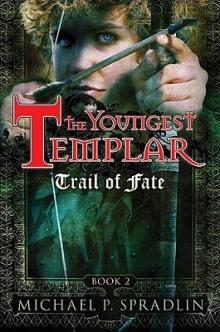 Trail of Fate
Trail of Fate Alcatraz
Alcatraz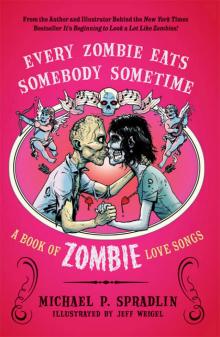 Every Zombie Eats Somebody Sometime
Every Zombie Eats Somebody Sometime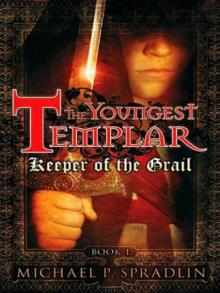 Keeper of the Grail tyt-1
Keeper of the Grail tyt-1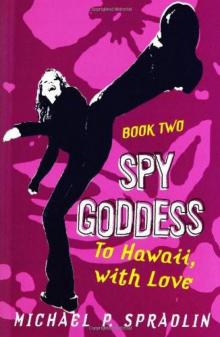 To Hawaii, with Love
To Hawaii, with Love Out for Blood
Out for Blood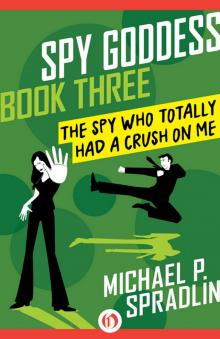 The Spy Who Totally Had a Crush on Me
The Spy Who Totally Had a Crush on Me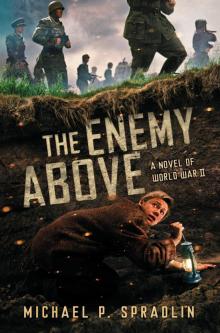 The Enemy Above
The Enemy Above Menace From the Deep
Menace From the Deep It's Beginning to Look a Lot Like Zombies
It's Beginning to Look a Lot Like Zombies Feeding Frenzy
Feeding Frenzy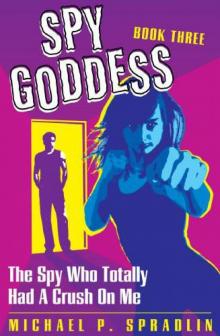 3 The Spy Who Totally Had a Crush on Me
3 The Spy Who Totally Had a Crush on Me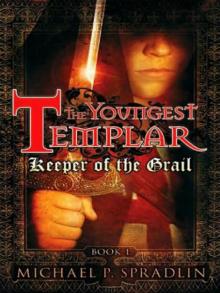 Keeper of the Grail
Keeper of the Grail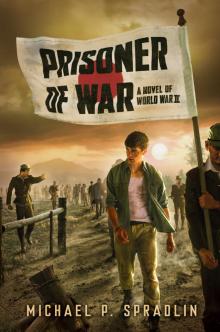 Prisoner of War
Prisoner of War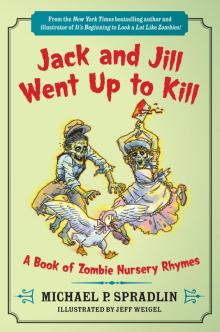 Jack and Jill Went Up to Kill
Jack and Jill Went Up to Kill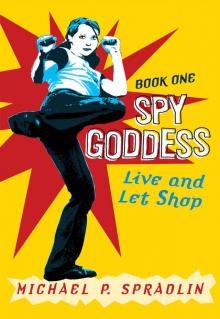 Live and Let Shop
Live and Let Shop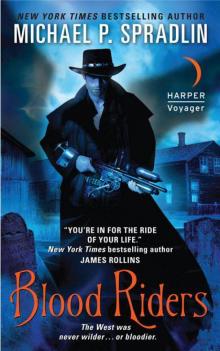 Blood Riders
Blood Riders Ultimate Attack
Ultimate Attack